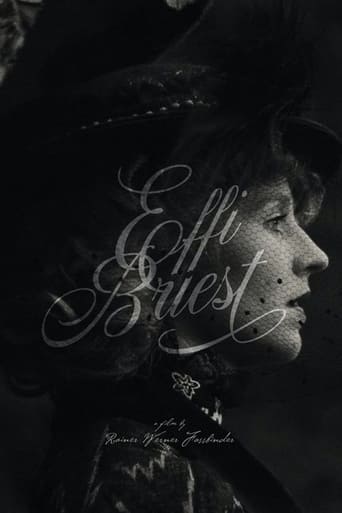gavin6942
In the nineteenth century, seventeen year old Effi Briest is married to the older Baron von Instetten and moves into a house, that she believes has a ghost, in a small isolated Baltic town.Similarities between "Effi Briest" and 20th-century Germany were easily found, helping to explain the popularity of the book and its subsequent film adaptions there. During the 1970s, West Germany was being racked by civil unrest as people sought to effect change, among these movements was the women's civil rights movement, which became a major influence for the film, as it compared the repressive nature in society between 19th century Prussia and 1970s West Germany.Fassbinder is one of the giants of new German cinema (by "new" I mean post-WWII), and here he demonstrates his prowess. Epic in length, using black and white to its fullest extent... this is one of those films that made him great, even if it may not be the most-remembered of Fassbinder films.
Ben Parker
Effie is a young maiden who marries a Baron and talks about ghosts a lot. Effie Briest is in black and white, and its by Fassbinder. Beyond that, I just didn't like it. The characters are cold and distant, they move like statues and speak slowly as in a Dreyer film. The narrative techniques create a literacy atmosphere, fading to white, having brief title cards, and a narrator (voiced by Fassbinder) who interferes long after when he was needed, keeping us at a distance. Its a nice looking film, gorgeous in black and white, often like a painting of 18th Century characters standing on beaches or in drawing rooms. It doesn't remind me of Sirk specifically, aside from the few shots in mirrors and the overly composed shots. There's no histrionics, and hardly any music; melo in melodrama means music. The scenes on the beach where the narrator talks for minutes while we watch the characters from a mid-shot are either meant to be funny or they don't work at all, I can't decide. After watching some Ingmar Bergman films, the massive lack of humanity in this Fassbinder film makes it feel totally empty to me.
ans-2
a highly philosophical, political, deep, beautiful masterpiece of Fontane, reiterated by Fassbinder. I believe that Fassbinder chose this book because it's reflects his own story of "Angst", in his case, the guilt that if we know the mistakes of our society but still hesitate to rebel.this movie, as most Fassbinder titles is no superficial hollywood entertainment, it made me think.
Sorsimus
When reviewing an ordinary film (like Jurassic Park) It is customary to note if the film is not particularly "cinematic". This would then mean that the film in question wouldn't have flashy tracking shots, groovy camera angles, fast paced editing and so on. If these are considered to be good qualities in a film then Effi Briest surely is a bad film.But what if from the beginning the film was meant to be like this? Fassbinder has chosen to hide his work in order to bring forth the original book Effi Briest is based on. To do an adaptation of a text he obviously liked a lot can't have been an easy task to a filmmaker who never relied on existing models of filmmaking. Considering that, one must view Effi Briest as an attempt to create a film as faithful as possible to the original.The result, however, is not alltogether satisfying because most of us will interpret it through a framework of "watching a film". And it must be noted that as a film Effi Briest is slowgoing, static (as is to be expected) and dramatically flat. This could be perhaps a result of a Brechtian device of Fassbinder's to prevent the audience from sinking into the plot (which in itself would be a fine starting point for a soap)but what difference does it make if the film is unwatchable.


